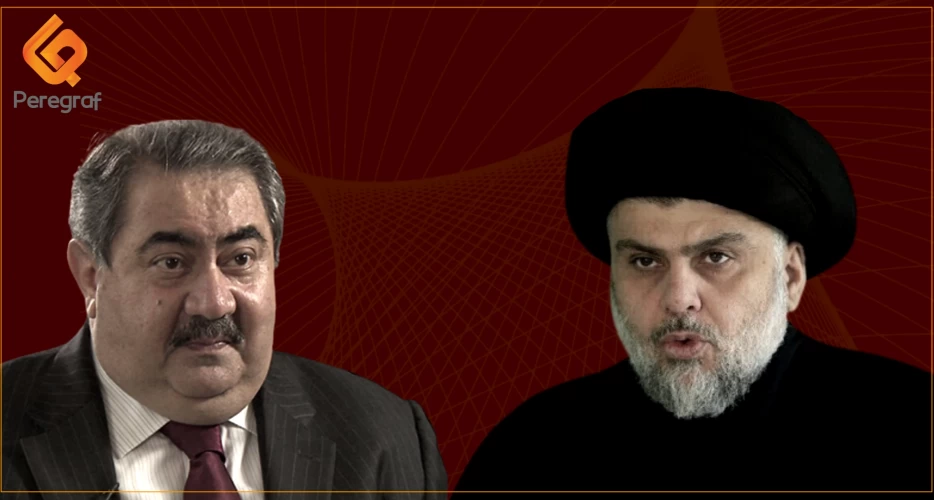
PEREGRAF – Surkew Mohammed
Amid the heated conflict between the Patriotic Union of Kurdistan (PUK) and the Kurdistan Democratic Party (KDP)over the Iraqi presidency, Shia cleric and political leader Muqtada al-Sadr, whose party won the most seats in the Council of Representatives last election, released a tweet that could upend the contest. The question is whether Sadr’s intervention represents the termination of KDP candidate Hoshyar Zebari’sattempt to oust PUK incumbent Barham Salih or if it is “a trap” to lure in additional votes from parties wary of the KDP’s candidate.
"If the candidate of our allied KDP for the post of President of the Republic does not completely meet the conditions [to be president], I ask the reform parliamentarians not to vote for him. We are calling for reform, not power and governing," Sadr said in a tweet sent on Friday (February 4).
Following up on the tweet, the Sadrist faction announced on Saturday that they would boycott Monday’s session of parliament to vote on the presidency and freeze all negotiations on government formation indefinitely.
Zebari failed a no-confidence vote in parliament in 2016 while serving as finance minister over allegations of corruption. Some, including from the PUK, have raised objections to his candidacy on this basis. A member of the PUK has traditionally held the presidency and the party is loath to lose it.
Sadr is a mercurial politician, known for switching positions either in response to changing conditions or as a way to affect them himself. His tweets, which he uses to send special messages, are objects of heated discussion and debate in political and media circles.
The conditional language of Friday’s tweet about Zebari – using “if” in reference to whether Zebari meets the qualifications to be president and adding the question of whether he does so“completely” – could be read in different ways, particularly with regard to who is making such a determination.
Earlier in the week, the Federal Supreme Court ruled that the election of the president must take place with a quorum of two-thirds of parliament, or 220 MPs, but has not decided on whether the corruption allegations against Zebari disqualify him. His name was included among the 25 that are going to be on the first ballot when the Council of Representatives meets for the vote, which had been scheduled for Monday.
The alliance between Sadr, the KDP, and the Sunni bloc led by Speaker Mohammed al-Halbousi does not command that necessary two-thirds majority to push through Zebari on their own and need support from other groups.
On the one hand, Sadr’s tweet can be read as a weakening of this tripartite alliance, with his apparent questioning of Zebari’ssuitability for the presidency as a way to shield himself from allegations from the street that he is ignoring corruption at the highest levels.
On the other hand, the tweet could be read more innocuously, with Sadr merely throwing a bone to critics while maintaining support for Zebari in an effort to attract enough MPs to reach the necessary two-thirds threshold. For the PUK, this would give them away to say that they are working in accord with Sadr, rather than simply bowing to the will of KDP leader Masoud Barzani.
At first, it appeared that the PUK was working with the other members of the Shia Coordination Framework, which is composed of a number of non-Sadrist Shia parties including some with close ties to Iran, to break the alliance between Sadr, the KDP, and Halbousi, with the idea that the process would revert to the old consensus model of government formation used in previous cycles. But Sadr refuses to lose the KDP’s 31 votes merely to gain the PUK’s 17. In reality, the knot that needs to be undone is what to do about Sadr’s refusal to allow former prime minister Nouri al-Maliki’s party to remain part of the government, which has been demanded by the Coordination Framework.
Peregraf earlier reported that the PUK’s legal team had launched a challenge in federal court to Zebari’s candidacy and is seeking documents from the Integrity Commission about the case against the former minister.
Some within the PUK see Sadr’s tweet as a recognition that Zebari’s chances could be impacted by the challenge and that he will seek to form a new kind of coalition, which will boost the chances of their candidate, Barham Salih. But this coordination will not be easy and will face significant opposition from the KDP, with Barzani’s opposition to Salih a significant barrier.
"Sadr's stance was anticipated and expected," a senior PUK source told Peregraf.
“Sadr, after the federal court's decision, found that he could not find two-thirds of the parliamentarians and had the best excuse for dismantling the front he had formed and forming a new coalition," the source added.
Sadr has frequently tried to buck conventional Iraqi politics in order to differentiate himself from the other political blocs and endear himself to the street, who have long expressed frustration about governance in the country.
The coming days will show whether the meaning behind Sadr’s tweet and decision to boycott the vote represents a true change in the political situation regarding his attitude towards Barzani or whether it is merely a tactic to placate those upset about Zebari’s candidacy.